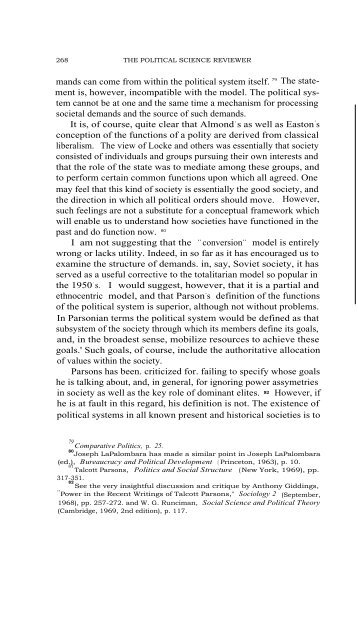FUNCTIONALISM AND ITS CRITICS - Intercollegiate Studies Institute
FUNCTIONALISM AND ITS CRITICS - Intercollegiate Studies Institute
FUNCTIONALISM AND ITS CRITICS - Intercollegiate Studies Institute
Create successful ePaper yourself
Turn your PDF publications into a flip-book with our unique Google optimized e-Paper software.
268 THE POLITICAL SCIENCE REVIEWER<br />
mands can come from within the political system itself. 79 The statement<br />
is, however, incompatible with the model. The political system<br />
cannot be at one and the same time a mechanism for processing<br />
societal demands and the source of such demands.<br />
It is, of course, quite clear that Almond ' s as well as Easton ' s<br />
conception of the functions of a polity are derived from classical<br />
liberalism. The view of Locke and others was essentially that society<br />
consisted of individuals and groups pursuing their own interests and<br />
that the role of the state was to mediate among these groups, and<br />
to perform certain common functions upon which all agreed. One<br />
may feel that this kind of society is essentially the good society, and<br />
the direction in which all political orders should move. However,<br />
such feelings are not a substitute for a conceptual framework which<br />
will enable us to understand how societies have functioned in the<br />
past and do function now. 80<br />
I am not suggesting that the " conversion " model is entirely<br />
wrong or lacks utility. Indeed, in so far as it has encouraged us to<br />
examine the structure of demands. in, say, Soviet society, it has<br />
served as a useful corrective to the totalitarian model so popular in<br />
the 1950 ' s. I would suggest, however, that it is a partial and<br />
ethnocentric model, and that Parson ' s definition of the functions<br />
of the political system is superior, although not without problems.<br />
In Parsonian terms the political system would be defined as that<br />
subsystem of the society through which its members define its goals,<br />
and, in the broadest sense, mobilize resources to achieve these<br />
goals.' Such goals, of course, include the authoritative allocation<br />
of values within the society.<br />
Parsons has been. criticized for. failing to specify whose goals<br />
he is talking about, and, in general, for ignoring power assymetries<br />
in society as well as the key role of dominant elites. S2 However, if<br />
he is at fault in this regard, his definition is not. The existence of<br />
political systems in all known present and historical societies is to<br />
79<br />
Comparative Politics, p. 25.<br />
80<br />
Joseph LaPalombara has made a similar point in Joseph LaPalombara<br />
(ed.), Bureaucracy and Political Development ( Princeton, 1963), p. 10.<br />
81<br />
Talcott Parsons, Politics and Social Structure (New York, 1969), pp.<br />
317-351.<br />
82<br />
See the very insightful discussion and critique by Anthony Giddings,<br />
" Power in the Recent Writings of Talcott Parsons," Sociology 2 (September,<br />
1968), pp. 257-272. and W. G. Runciman, Social Science and Political Theory<br />
(Cambridge, 1969, 2nd edition), p. 117.
















